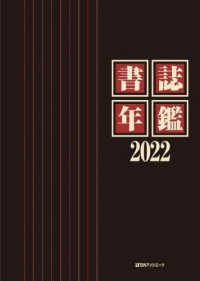- ホーム
- > 洋書
- > 英文書
- > Science / Mathematics
Full Description
This detailed volume presents a series of protocols that are representative of recent developments and improvements in induced pluripotent stem cells (iPS cells) and corresponding human disease models. Reflecting the latest technology for generating induced pluripotent stem cells (iPS cells) and their initial characterization, the book explores techniques invaluable both for studies of disease-specific cell types and for their potential applications in regenerative medicine. Written for the highly successful Methods in Molecular Biology series, chapters include introduction to their respective topics, lists of the necessary materials and reagents, step-by-step and readily reproducible laboratory protocols, as well as tips on troubleshooting and avoiding known pitfalls.
Authoritative and practical, Induced Pluripotent Stem Cells and Human Disease: Methods and Protocols serves as a vital guide that is valuable for not only experts butalso novices in the stem cell field.
Contents
- Analysis of Mitochondrial Dysfunction by Microplate Reader in hiPSC-Derived Neuronal Cell Models of Neurodegenerative Disorders. - Generation and Hematopoietic Differentiation of Mesenchymal Stromal/Stem Cell-Derived Induced Pluripotent Stem Cell Lines for Disease Modeling of Hematopoietic and Immunological Diseases. - Establishment of Human Induced Pluripotent Stem Cells from Multiple Sclerosis. - Monitoring Axonal Degeneration in Human Pluripotent Stem Cell Models of Hereditary Spastic Paraplegias Patients. - Efficient Generation of Functional Hepatocytes from Human Induced Pluripotent Stem Cells for Disease Modeling and Disease Gene Discovery. - Autophagy Dysfunction as a Phenotypic Readout in hiPSC-Derived Neuronal Cell Models of Neurodegenerative Diseases. - Derivation of Induced Pluripotent Stem Cell (iPSC) Lines from Patient-Specific Peripheral Blood Mononuclear Cells (PBMC) Using Episomal Vectors. - Differentiating Induced Pluripotent Stem Cells Toward Mesenchymal Stem/Stromal Cells. - A High-Efficiency Method for the Production of Endothelial Cells from Human Induced Pluripotent Stem Cells. - Image-Based Quantitation of Kainic Acid-Induced Excitotoxicity as a Model of Neurodegeneration in Human iPSC-Derived Neurons. - Amyloid β (Aβ) ELISA of Human iPSC-Derived Neuronal Cultures. - Creating Cell Model 2.0 Using Patient Samples Carrying a Pathogenic Mitochondrial DNA Mutation: iPSC Approach for LHON. - CRISPR Guide RNA Library Screens in Human Induced Pluripotent Stem Cells. - Generation and Encapsulation of Human iPSC-Derived Vascular Smooth Muscle Cells for Proangiogenic Therapy. - Methods to Induce Small-Scale Differentiation of iPS Cells into Dopaminergic Neurons and to Detect Disease Phenotypes. - Modeling Early Neural Crest Development via Induction from hiPSC-Derived Neural Plate Border-like Cells. - Generation of Human Induced Pluripotent Stem Cells from Renal Epithelial Cells. - A Protocol for Stepwise Differentiation of Induced Pluripotent Stem Cells into Retinal Pigment Epithelium. - Genome Editing of Induced Pluripotent Stem Cells Using CRISPR/Cas9 Ribonucleoprotein Complexes to Model Genetic Ocular Diseases. - Generation of Cardiomyocytes and Endothelial Cells from Human iPSCs by Chemical Modulation of Wnt Signaling. - Immunoassay for Quantitative Detection of Antibody Transcytosis Across the Blood-Brain Barrier In Vitro. - Generation of Cortical, Dopaminergic, Motor, and Sensory Neurons from Human Pluripotent Stem Cells. - CRISPR/Cas-Mediated Knock-in of Genetically Encoded Fluorescent Biosensors into the AAVS1 Locus of Human-Induced Pluripotent Stem Cells. - Cancer Stem Cell Initiation by Tumor-Derived Extracellular Vesicles. - Genome Editing Using Cas9-gRNA Ribonucleoprotein in Human Pluripotent Stem Cells for Disease Modeling.





